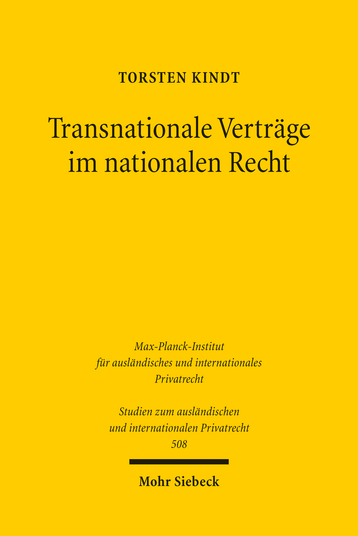Out Now: Torsten Kindt, Transnationale Verträge im nationalen Recht
It is a truth universally acknowledged that a significant portion of international commerce is organized around instruments and structures that do not emanate from national states and laws but from private entities. Traditionally, most legal scholars addressing this phenomenon could be sorted into one of two camps: those who want to limit the notion of ‘law’ to the state and see instances of private ordering primarily as social, rather than legal phenomena; and those who consider national law already as a abstract concept with limited and decreasing importance for the reality of international business. Torsten Kindt belongs to neither of those two camps. With his recently published book, based on his doctoral thesis, he attempts to fill the gap left between the two seemingly irreconcilable positions, with a special focus on the transnational dimension of private ordering.
Kindt develops his argument in two steps. In the first part of the book (chapters 1 and 2), he takes a closer look at three instruments of particular importance for the financial sector that have largely been developed by private actors and independently from state law: letters of credit, syndicated loans, and credit derivatives. He focuses on the structural similarities between those instruments in order to demonstrate, in particular, the surprising degree to which they still incorporate and react to state law.
In the second part of the book (chapters 3 to 6), Kindt then introduces the concept of the ‘transnational contract’ – a contract corresponding to, and executed in accordance with, an internationally accepted model document negotiated and supervised by members of the relevant sector or industry – in order to discuss the ways in which existing state law can, in turn, incorporate the reality of the previously discussed instruments. For each area of law discussed – choice of law, contract law, and international civil procedure – Kindt identifies a variety of avenues for such incorporation, including, e.g. a (very) generous approach to choice-of-law and choice-of-court clauses that are linked or correspond to a model document.
Listing all the other intersections between transnational contracts and state law discussed by Kindt would exceed the limits of this post. Fortunately, though, the book itself is available open access, offering to the reader not only a wealth of insights into the private ordering of international finance but also a spirited and stimulating discussion of its present and potential future incorporation into national and international private law. It is highly recommended to anyone working on international business law, legal pluralism, and anything in between.



My feeling?private ordering can be more effective than state in many instances eg Visa card, internet, ucp600 (letters of credit), incoterms, even arbitration.
My feeling?private ordering can be more effective than state in many instances eg Visa card, internet, ucp600 (letters of credit), incoterms, even arbitration.